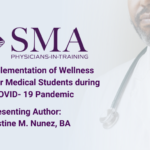Abstract | May 4, 2021
Virtual Implementation of Wellness Initiatives for Medical Students during the COVID- 19 Pandemic
Learning Objectives
- Identify alternative methods to deliver virtual wellness programming that maintains maintain medical student well-being during a time of increased isolation, anxiety, and depression;
- Identifying and promoting aspects of wellness that are not often discussed in the context of medical education (ex. sexual well-being, performing arts, skin care);
- Increase medical student engagement and participation in virtual activities.
Introduction:
The Wellness Advisory Council (WAC) is a student-led organization created at the University of Miami Miller School of Medicine to support medical student well-being. A chairperson leads each of the five domains of wellness (Academic & Professional Development, Interpersonal, Community & Service, Mind, and Body) identified in our school community, and student leaders collaborate with other organizations and the administration to implement supportive programs. Medical students show higher rates of depression, suicidal ideation, and stigmatization and are less likely to seek support when compared to their non-medical peers. [1] The COVID-19 pandemic posed significant challenges to students’ physical and mental health. Technology has been integral in overcoming challenges of implementing wellness programming. [1] Nationally, educators recognized the essential need for strategies to support students’ physical and mental health remotely and safely. [2]
Program Description:
To address the difficulties maintaining student engagement, the WAC created a novel series of virtual activities to promote student wellness during the pandemic. These included school-wide fitness challenges, scavenger hunts, and weekly workshops. Multiple social media platforms and word of mouth were employed to promote, market, and engage with participants weekly, communicating updates on challenges, and to promote group camaraderie. Student organizations also hosted hour-long zoom workshops called “Virtual Wellness Wednesdays.” Creative efforts included welcoming pets to events online, offering raffle prizes, and Instagram student takeovers to promote interest. Phone apps were used to track miles and steps, and overall participation. Hosts selected activities suitable for at-home participation with little need for additional materials. In total, 185 students/faculty participated in outdoor challenges yielding a total of 8,785,843 steps!
Outcome/Significance:
COVID-19 limitations drove innovation, resulting in successful implementation of virtual initiatives. Despite “zoom fatigue,” the team witnessed an increase in participation in weekly events, monthly challenges, exceeding pre- pandemic engagement. The busy student schedule historically challenged live attendance. The success of these virtual wellness initiatives has confirmed WAC’s decision to incorporate virtual offerings in ongoing and future programming. WAC’s implementation of virtual wellness activities and effective maintenance of engagement during the pandemic can serve as a model for maintaining student wellness during future challenging times.
References and Resources:
- Chandratre S. Medical Students and COVID-19: Challenges and Supportive Strategies. Journal of Medical
Education and Curricular Development. January 2020. - Remtulla R. The Present and Future Applications of Technology in Adapting Medical Education Amidst the
COVID-19 Pandemic. JMIR Med Educ. 2020;6(2).

